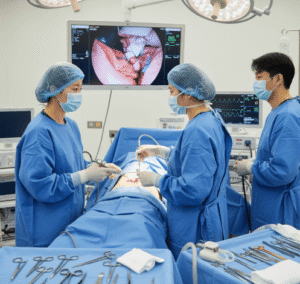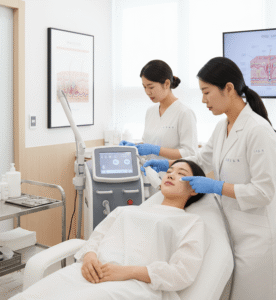Overview
Burping, medically known as eructation, is the act of expelling gas from the stomach through the mouth, often accompanied by a sound. It is a common digestive process that helps release swallowed air and relieve gastric pressure. While occasional burping is normal, excessive or persistent burping may indicate underlying digestive issues such as acid reflux, gastritis, or food intolerances. In Korea, gastroenterology clinics and hospitals offer advanced diagnostic testing, lifestyle counseling, and therapeutic interventions to address excessive burping and related digestive disorders effectively.
Key Facts
▶ Prevalence: Very common in adults and children; usually harmless.
▶ Causes: Swallowing air, carbonated beverages, certain foods, or digestive disorders.
▶ Associated Symptoms: Bloating, abdominal discomfort, nausea, acid reflux, or heartburn.
▶ Treatment Options in Korea: Dietary management, medications, endoscopic evaluation, and lifestyle modifications.
▶ Duration: Occasional burping is normal; persistent burping may require evaluation.
What is Burping?
Burping occurs when air or gas accumulated in the stomach is released through the esophagus and mouth.
▶ Normal Burping: Occasional release of swallowed air, typically after meals or carbonated drinks.
▶ Excessive Burping: Frequent belching unrelated to meals or drinks, sometimes associated with digestive disorders.
▶ Associated Gas Formation: May result from fermentation of food in the stomach or small intestine.
▶ Functional Dyspepsia: Chronic or unexplained burping without clear structural abnormalities.
Note: Burping is often benign, but persistent or symptomatic burping warrants medical attention.
What Symptoms Are Related to Burping?
▶ Frequent Belching: Excessive release of air, sometimes multiple times per hour.
▶ Bloating: Abdominal fullness or distension.
▶ Abdominal Discomfort: Cramping or pain associated with gas buildup.
▶ Nausea: Occasionally accompanies excessive burping.
▶ Acid Reflux or Heartburn: Burning sensation in the chest or throat.
▶ Bad Taste in Mouth: Due to regurgitated stomach contents.
▶ Loss of Appetite: In some cases, discomfort leads to reduced food intake.
▶ Hiccups: Can occasionally accompany excessive burping.
What Causes / Possible Causes
Burping can result from multiple gastrointestinal, dietary, or lifestyle factors:
▶ Swallowed Air (Aerophagia): Rapid eating, drinking carbonated beverages, chewing gum, or smoking.
▶ Gastroesophageal Reflux Disease (GERD): Acid reflux causing frequent burping and heartburn.
▶ Peptic Ulcers: Gastric or duodenal ulcers leading to discomfort and gas accumulation.
▶ Gastritis: Inflammation of the stomach lining increasing gas production and belching.
▶ Food Intolerances: Lactose, fructose, or other carbohydrate malabsorption leading to fermentation and gas.
▶ Helicobacter pylori Infection: Bacterial infection of the stomach contributing to excessive burping.
▶ Functional Dyspepsia: Chronic upper digestive discomfort without structural disease.
▶ Medications: Some drugs, including antibiotics or NSAIDs, may irritate the stomach and increase burping.
▶ Psychological Factors: Stress and anxiety can contribute to air swallowing and functional dyspepsia.
Note: Identifying the underlying cause is critical for effective management and prevention of complications.
When Should I See a Doctor?
▶ Persistent Burping: Occurring daily or interfering with normal activities.
▶ Associated Pain or Discomfort: Abdominal pain, nausea, or bloating that is severe or worsening.
▶ Acid Reflux Symptoms: Frequent heartburn, regurgitation, or difficulty swallowing.
▶ Unexplained Weight Loss: May indicate a serious gastrointestinal disorder.
▶ Vomiting or Blood in Vomit: Could suggest ulcers or gastrointestinal bleeding.
▶ Change in Bowel Habits: Persistent diarrhea or constipation with burping.
▶ Medication-Related Concerns: If burping started after starting new medications.
Tip: Prompt evaluation in Korea ensures accurate diagnosis and personalized treatment, preventing chronic complications or discomfort.
Care and Treatment
Management depends on dietary habits, lifestyle adjustments, and treating underlying conditions:
▶ Dietary Modifications: Avoid carbonated drinks, chewing gum, and gas-producing foods.
▶ Eating Habits: Slow down eating, avoid overeating, and chew food thoroughly.
▶ Medications: Antacids, proton pump inhibitors, or prokinetic drugs for reflux or gastritis.
▶ Hydration: Adequate water intake to aid digestion and reduce gas accumulation.
▶ Lifestyle Changes: Smoking cessation, stress management, and regular physical activity.
▶ Probiotics: May improve gut flora and reduce excessive gas production.
▶ Monitoring: Keep a diary of foods, symptoms, and triggers for personalized care.
Treatment Options in Korea
Medical Evaluation:
▶ Gastroenterology Consultation: Comprehensive assessment including history, physical exam, and risk factor evaluation.
▶ Laboratory Tests: H. pylori testing, blood tests, and stool analysis if infection or malabsorption is suspected.
▶ Endoscopy: Upper GI endoscopy to assess for ulcers, gastritis, or reflux-related changes.
▶ Imaging: Ultrasound or CT scans if structural abnormalities or chronic digestive issues are suspected.
Advanced Therapies:
▶ Medication Therapy: Tailored treatment with antacids, proton pump inhibitors, or prokinetics.
▶ H. pylori Eradication: Antibiotic therapy if bacterial infection is detected.
▶ Endoscopic Intervention: Rarely, for complications such as ulcers or strictures.
▶ Dietary Counseling: Personalized nutrition plans to reduce gas and improve digestion.
Rehabilitation & Support:
▶ Patient Education: Techniques to reduce swallowed air, manage stress, and maintain gut health.
▶ Follow-Up Care: Monitoring response to treatment and adjustment of therapy as needed.
▶ Specialist Clinics: Korean hospitals offer integrated care combining gastroenterology, dietetics, and patient education for long-term management.
Outcome: With proper evaluation and management in Korea, burping is effectively controlled, underlying digestive issues are treated, and overall gastrointestinal health is improved, enhancing quality of life and comfort.













